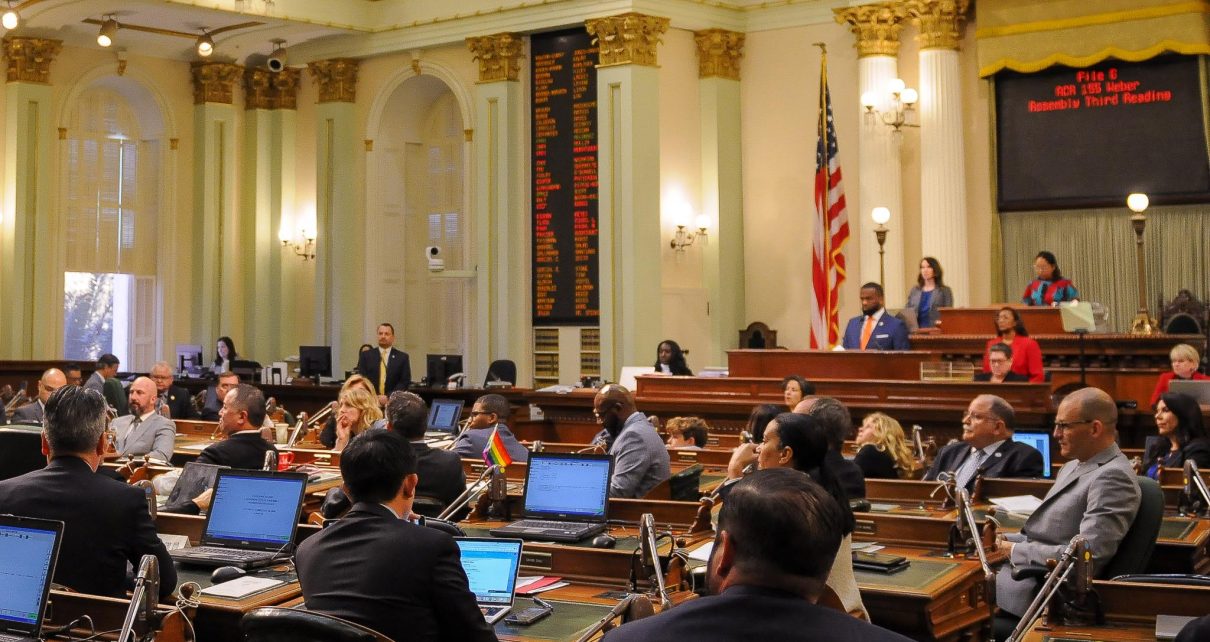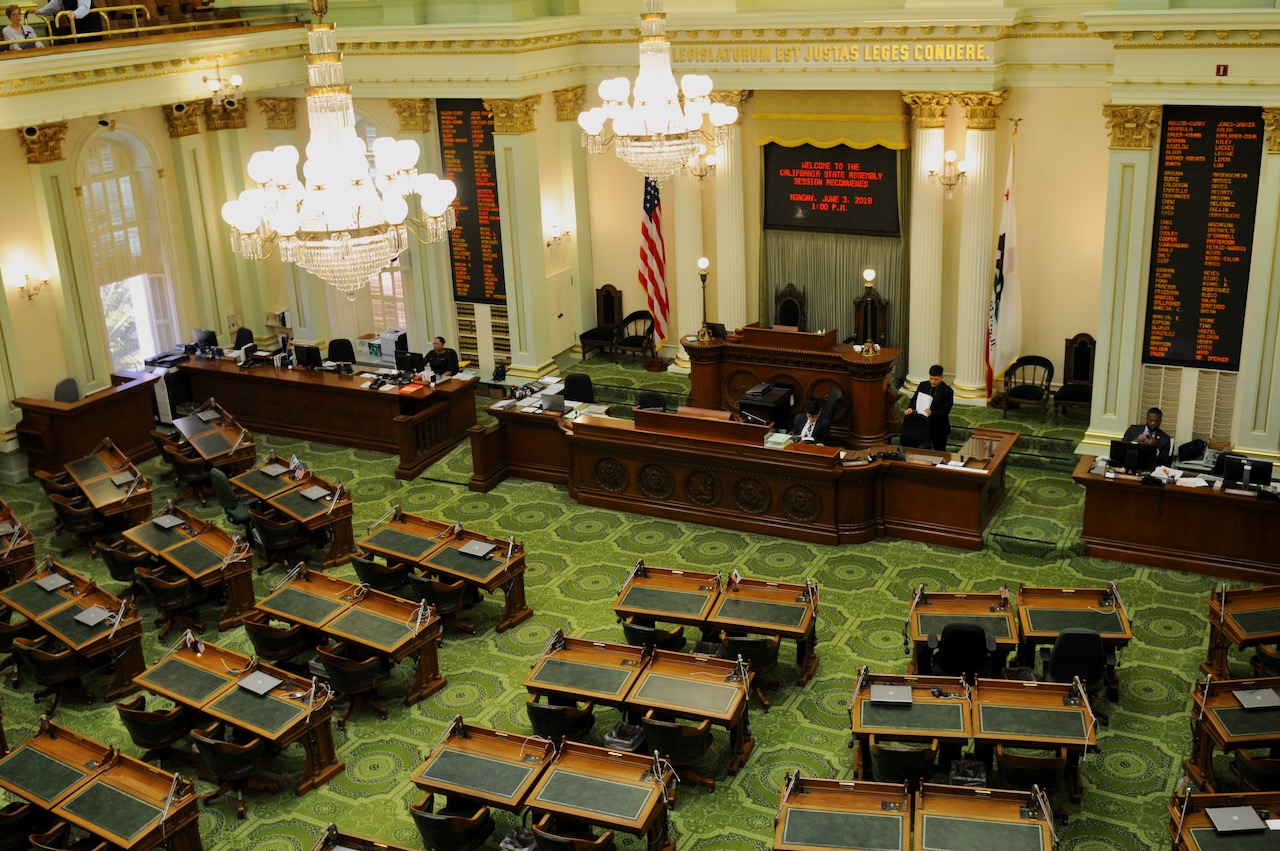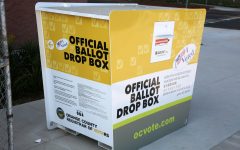
California State Assembly. (Photo: Kevin Sanders for California Globe)
The Law Allowing Measures to Be Withdrawn from the Ballot
The ‘Ballot Initiative Transparency Act’
By Chris Micheli, June 30, 2024 10:42 am
In the 2014 California Legislative Session, then-State Senator Darrell Steinberg (D-Sacramento) authored Senate Bill 1253, which became Chapter 697 when the Governor signed the bill on September 27. SB 1253 amended California Elections Code Sections 9, 101, 9002, 9004, 9005, 9014, 9030, 9031, 9033, 9034, 9051, 9082.7, 9094.5, 9604, and 18621.
Among its many provisions are:
(1) Requiring the Attorney General, upon receipt of a request to prepare the circulating title and summary, to initiate a 30-day public review process for the proposed initiative measure.
(2) Requiring the fiscal estimate of a proposed initiative measure be prepared jointly by the Department of Finance and the Legislative Analyst.
(3) Extending the date that a petition with signatures on a proposed initiative measure is required to be filed with the county elections official to not later than 180 days from the official summary date.
(4) Requiring the Secretary of State to issue a notice directing that signature verification be terminated in certain instances.
(5) Requiring the Secretary of State to identify the date of the next statewide election and, on the 131st day prior to that election, to issue a certificate of qualification certifying that the initiative measure is qualified for the ballot at that election.
(6) Requiring the Secretary of State to transmit copies of the initiative measure and circulating title and summary to the Legislature after receiving a certification from the initiative proponents that they have collected 25% of the number of signatures needed to qualify the initiative measure for the ballot.
(7) Requiring the appropriate committees of the Senate and Assembly to hold the joint public hearing on the subject of the measure not later than 131 days prior to the date of the election at which the measure is to be voted upon.
(8) Requiring the Secretary of State to establish processes to enable a voter to receive the state ballot pamphlet in an electronic format instead of by mail, and maintain information about each ballot measure on the SOS website.
(9) Authorizing the proponents of a statewide initiative or referendum measure to have the measure withdrawn from the ballot at any time before the measure qualifies for the ballot.
(10) Requiring a petition for a statewide initiative measure to contain additional prescribed language in its notice to the public describing the right of proponents to withdraw the measure from the ballot.
(11) Making it a crime for a proponent of a statewide initiative measure to seek, solicit, bargain for, or obtain any money or thing of value of or from any person, firm, or corporation for the purpose of withdrawing an initiative petition after filing it with the appropriate elections official.
Section 1 of the bill named the law as the “Ballot Initiative Transparency Act.” Section 2 of the bill set forth five legislative findings and declarations, including that:
(3) Identifying and correcting flaws in an initiative measure before it appears on the ballot. Currently, proponents of an initiative measure have few options to correct the language of an initiative measure or to withdraw a petition for a proposed initiative measure, even when flaws are identified. This act would give voters an opportunity to comment on an initiative measure before the petition is circulated for signatures. Public comment may address perceived errors in the drafting of, or perceived unintended consequences of, the proposed initiative measure. By extending the time for gathering signatures, this act would give the Legislature the opportunity to hold earlier public hearings to review initiative measures. This act would also allow the proponents of an initiative measure to withdraw the measure after the petition and signatures are submitted to elections officials, but before the measure qualifies for the ballot.
Section 4 of the bill requires a petition to gather signatures to contain the following language:
“THE PROPONENTS OF THIS PROPOSED INITIATIVE MEASURE HAVE THE RIGHT TO WITHDRAW THIS PETITION AT ANY TIME BEFORE THE MEASURE QUALIFIES FOR THE BALLOT.”
Section 5 of the bill requires the Attorney General to initiate a public review process for a period of 30 days. The proposed initiative measure is required to be on the AG’s website and the AG must invite written public comments on the proposed initiative measure, which become public records and subject to inspection.
During this 30-day period, the proponent of a measure may submit amendments to the measure “that are reasonably germane to the theme, purpose, or subject of the initiative measure as originally proposed. However, amendments shall not be submitted if the initiative measure as originally proposed would not effect a substantive change in law.”
Section 7 of the bill requires the Department of Finance and the Legislative Analyst (rather than the Joint Legislative Budget Committee that was provided under prior law) to prepare the “estimate of the amount of any increase or decrease in revenues or costs to the state or local government, or an opinion as to whether or not a substantial net change in state or local finances would result if the proposed initiative is adopted.”
Section 11 of the bill requires the Secretary of State to identify the date of the next statewide general election that will occur not less than 131 days after the date the SOS receives a petition certified to have been signed by the requisite number of qualified voters. Then SOS issues a certificate of qualification certifying that the initiative measure, as of that date, is qualified for the ballot at the election identified. SOS must include the measure in the list of statewide measures, and fulfill other specified requirements.
Section 12 of the requires the proponents of a proposed initiative measure to submit a certification, signed under penalty of perjury, to the Secretary of State immediately upon the collection of 25 percent of the number of signatures needed to qualify the initiative measure for the ballot.
Section 13 of the bill requires the Attorney General to invite and consider public comment in preparing each ballot title and summary.
Section 14 of the bill requires SOS to have a website that includes specified information of each state ballot measure.
Section 15 requires the SOS to have a process to enable voters to opt-out of receiving by mail the state ballot pamphlet and to receive it in an electronic format or an electronic notification making the pamphlet available by means of online access.
Section 16 of the bill amended Elections Code Section 9604 to provide that “the proponents of a statewide initiative or referendum measure may withdraw the measure after filing the petition with the appropriate elections official at any time before the Secretary of State certifies that the measure has qualified for the ballot.”
Note that existing Elections Code Section 9604 already provides the following:
(a) Notwithstanding any other law, any person may engage in good faith bargaining between competing interests to secure legislative approval of matters embraced in a statewide or local initiative or referendum measure, and the proponents may, as a result of these negotiations, withdraw the measure at any time before filing the petition with the appropriate elections official.
(c) Withdrawal of a statewide initiative or referendum measure shall be effective upon receipt by the Secretary of State of a written notice of withdrawal, signed by all proponents of the measure.
(d) Withdrawal of a local initiative or referendum measure shall be effective upon receipt by the appropriate local elections official of a written notice of withdrawal, signed by all proponents of the measure.
Section 17.5 of the bill provides that the proponent of an initiative or referendum cannot seek, solicit, or obtain any money or thing of value for obtaining signatures or withdrawing an initiative petition after filing it with the appropriate elections official.
- Deposit of Unclaimed Property in California - February 8, 2026
- Is There a Funding Requirement for Prop. 36? - February 7, 2026
- Definitions for Enforcement of Judgments - February 7, 2026




